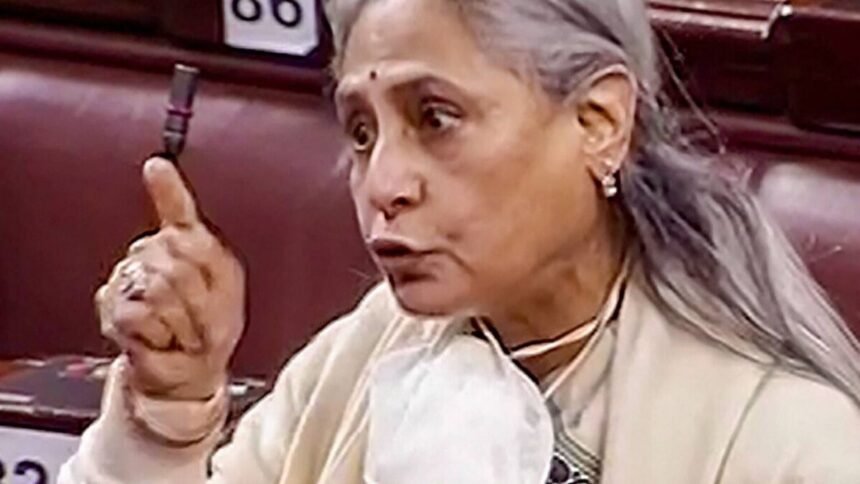In a recent session of the Indian Parliament, veteran actress and Member of Parliament, Jaya Bachchan, captured headlines for expressing her frustration and displaying visible agitation during a debate. The incident, which occurred during discussions on the functioning of the Rajya Sabha, shed light on the underlying tensions and challenges faced by lawmakers in India’s parliamentary democracy.
Jaya Bachchan, a prominent figure in the Indian film industry, has been serving as a Member of Parliament in the Rajya Sabha since 2004. Known for her outspoken nature and advocacy for social causes, Bachchan has been an active participant in parliamentary proceedings, often raising pertinent issues related to women’s rights, healthcare, and education.
However, during a recent session of the Rajya Sabha, Bachchan’s patience wore thin as she voiced her frustration over the conduct of fellow parliamentarians. In a heated exchange, Bachchan admonished her colleagues, stating, “We’re not schoolchildren,” and calling for greater decorum and respect in parliamentary debates.
The incident underscores the challenges faced by lawmakers in maintaining civility and order in parliamentary proceedings, particularly during contentious debates and discussions. In recent years, the Indian Parliament has witnessed several instances of unruly behavior, disruptions, and verbal clashes among politicians, leading to frequent adjournments and legislative gridlock.
The deterioration of parliamentary decorum reflects broader trends of polarization and political dysfunction in India’s democratic institutions. As partisan divides deepen and political rhetoric becomes increasingly acrimonious, the sanctity of parliamentary debate is often compromised, undermining the democratic process and eroding public trust in elected representatives.
Moreover, the incident involving Jaya Bachchan highlights the unique pressures faced by celebrity lawmakers who straddle the worlds of politics and entertainment. While their celebrity status may afford them greater visibility and influence, it also subjects them to heightened scrutiny and expectations, both within and outside the political arena.
Bachchan’s outburst also raises questions about the efficacy of parliamentary reforms and institutional mechanisms aimed at fostering constructive debate and consensus-building. Despite efforts to introduce reforms such as the Anti-Defection Law and Code of Conduct for Members of Parliament, instances of disruptive behavior and parliamentary deadlock persist, hindering the legislative process and impeding progress on crucial policy issues.
In response to the incident, parliamentary leaders and officials have called for greater discipline and adherence to parliamentary norms and procedures. Speaker of the Rajya Sabha, Venkaiah Naidu, emphasized the importance of upholding the dignity of the House and fostering a culture of mutual respect and civility among parliamentarians.
Moving forward, there is a pressing need for introspection and collective action to address the underlying factors contributing to the erosion of parliamentary decorum in India. This includes fostering a culture of constructive dialogue, promoting bipartisanship, and strengthening institutional mechanisms for conflict resolution and consensus-building.
Furthermore, there is a need for greater public awareness and engagement in parliamentary affairs, empowering citizens to hold their elected representatives accountable for their conduct and performance in office. By promoting transparency, accountability, and civic participation, India can strengthen its democratic institutions and uphold the principles of parliamentary democracy.
Jaya Bachchan’s emotional outburst in Parliament serves as a poignant reminder of the complexities and duties ingrained in democratic governance. As India navigates the complexities of its democratic journey, fostering a culture of civility, respect, and collaboration in parliamentary debates is essential for upholding the integrity of the democratic process and advancing the interests of the nation and its citizens.









